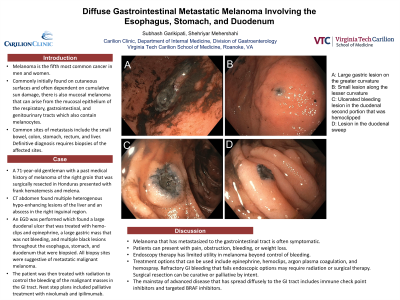Monday Poster Session
Category: GI Bleeding
P2066 - Diffuse Gastrointestinal Metastatic Melanoma Involving the Esophagus, Stomach, and Duodenum
Monday, October 23, 2023
10:30 AM - 4:15 PM PT
Location: Exhibit Hall

Has Audio
- SG
Subhash Garikipati, MD
Carilion Clinic Virginia Tech
Roanoke, VA
Presenting Author(s)
Subhash Garikipati, MD, Shehriyar Mehershahi, MD
Carilion Clinic Virginia Tech, Roanoke, VA
Introduction: Melanoma is the fifth most common cancer in men and women. Commonly initially found on cutaneous surfaces and often dependent on cumulative sun damage, there is also mucosal melanoma that can arise from the mucosal epithelium of the respiratory, gastrointestinal, and genitourinary tracts which also contain melanocytes. Common sites of metastasis include the small bowel, colon, stomach, rectum, and liver. Definitive diagnosis requires biopsies of the affected sites.
Case Description/Methods: A 71-year-old gentleman with a past medical history of melanoma of the right groin that was surgically resected in Honduras presented with frank hematemesis and melena. CT abdomen found multiple heterogenous hypo-enhancing lesions of the liver and an abscess in the right inguinal region. An EGD was performed which found a large duodenal ulcer that was treated with hemoclips and epinephrine, a large gastric mass that was not bleeding, and multiple black lesions throughout the esophagus, stomach, and duodenum that were biopsied. All biopsy sites were suggestive of metastatic malignant melanoma. The patient was then treated with radiation to control the bleeding of the malignant masses in the GI tract. The next step plans included palliative treatment with nivolumab and ipilimumab.
Discussion: Melanoma that has metastasized to the gastrointestinal tract is often symptomatic. Patients can present with pain, obstruction, bleeding, or weight loss. Endoscopy therapy has limited utility in melanoma beyond the control of bleeding. Treatment options that can be used include epinephrine, hemoclips, argon plasma coagulation, and hemospray. Refractory GI bleeding that fails endoscopic options may require radiation or surgical therapy. Surgical resection can be curative or palliative by intent. The mainstay of advanced disease that has spread diffusely to the GI tract includes immune checkpoint inhibitors and targeted BRAF inhibitors.

Disclosures:
Subhash Garikipati, MD, Shehriyar Mehershahi, MD. P2066 - Diffuse Gastrointestinal Metastatic Melanoma Involving the Esophagus, Stomach, and Duodenum, ACG 2023 Annual Scientific Meeting Abstracts. Vancouver, BC, Canada: American College of Gastroenterology.
Carilion Clinic Virginia Tech, Roanoke, VA
Introduction: Melanoma is the fifth most common cancer in men and women. Commonly initially found on cutaneous surfaces and often dependent on cumulative sun damage, there is also mucosal melanoma that can arise from the mucosal epithelium of the respiratory, gastrointestinal, and genitourinary tracts which also contain melanocytes. Common sites of metastasis include the small bowel, colon, stomach, rectum, and liver. Definitive diagnosis requires biopsies of the affected sites.
Case Description/Methods: A 71-year-old gentleman with a past medical history of melanoma of the right groin that was surgically resected in Honduras presented with frank hematemesis and melena. CT abdomen found multiple heterogenous hypo-enhancing lesions of the liver and an abscess in the right inguinal region. An EGD was performed which found a large duodenal ulcer that was treated with hemoclips and epinephrine, a large gastric mass that was not bleeding, and multiple black lesions throughout the esophagus, stomach, and duodenum that were biopsied. All biopsy sites were suggestive of metastatic malignant melanoma. The patient was then treated with radiation to control the bleeding of the malignant masses in the GI tract. The next step plans included palliative treatment with nivolumab and ipilimumab.
Discussion: Melanoma that has metastasized to the gastrointestinal tract is often symptomatic. Patients can present with pain, obstruction, bleeding, or weight loss. Endoscopy therapy has limited utility in melanoma beyond the control of bleeding. Treatment options that can be used include epinephrine, hemoclips, argon plasma coagulation, and hemospray. Refractory GI bleeding that fails endoscopic options may require radiation or surgical therapy. Surgical resection can be curative or palliative by intent. The mainstay of advanced disease that has spread diffusely to the GI tract includes immune checkpoint inhibitors and targeted BRAF inhibitors.

Figure: Metastatic melanoma of the duodenum
Disclosures:
Subhash Garikipati indicated no relevant financial relationships.
Shehriyar Mehershahi indicated no relevant financial relationships.
Subhash Garikipati, MD, Shehriyar Mehershahi, MD. P2066 - Diffuse Gastrointestinal Metastatic Melanoma Involving the Esophagus, Stomach, and Duodenum, ACG 2023 Annual Scientific Meeting Abstracts. Vancouver, BC, Canada: American College of Gastroenterology.
